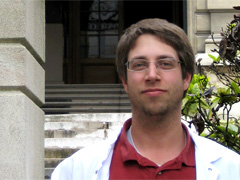City of Lights Gets Brighter
By Laura Pratt
Nicholas Nickerson, a postdoctoral fellow at the Institut Pasteur in Paris, once wandered the hallways of Sunnybrook Research Institute (SRI) with an emerging sense of his scientific self, just as so many of those who followed him do today.
Nickerson hails from Shag Harbour, NS, a tiny fishing village hanging on the edge of the Atlantic Ocean whose greatest claim to fame—until now—was a UFO sighting in 1967. But it might one day come to be known for more than that, possibly even for the scientific industry of a native son, who took his leave from this maritime setting in the latter days of the 20th century, unsure about his future.
Nickerson became interested in microbiology and biochemistry in his first year at Dalhousie University in Halifax, NS. When he left five years later, he did so with a B.Sc. and a keen respect for bacterial and viral systems. He arrived at SRI in the fall of 2002 to begin his master's and PhD degrees (he reclassified, two years in), supervised by Dr. Martin McGavin, an SRI researcher studying the human pathogen Staphylococcus aureus.
Nickerson defended his PhD in November 2008 and graduated from the University of Toronto in March 2009.
He calls his time at SRI "enjoyable and fruitful," not least because it was where he met Serena Brar, the woman who would become his wife (when they met, she was working for a biotech firm at Sunnybrook). But he also loved working in the lab. "It was a great place to work, and I will remember it as an important stepping-stone in my career."
While he was writing his thesis, Nickerson let his mind take flight to what the next stops along the way might be. "I spent a lot of time trying to determine what I wanted to achieve and where I wanted to live," he says.
It was at about this time that the Institut Pasteur—which has had 10 Nobel Prize winners in its 120-year history—came into focus.
One of Nickerson's thesis committee members, Dr. Dean Rowe-Magnus, a scientist in SRI's discipline of clinical integrative biology, had done his postdoctoral studies at the Pasteur, and shared passionately with his students memories of his time there. Intrigued and encouraged ("He was very optimistic," he says, of Rowe-Magnus), Nickerson sent a letter to a top researcher at the institute, Dr. Anthony Pugsley. He also applied for financial help to the Canadian Louis Pasteur Foundation, which awards two-year fellowships to scientists to continue their postdoctoral studies at the Institut Pasteur.
Last August, Nickerson got word that he had received a fellowship. He and his wife would be leaving for France in the fall. "It was scary to think of leaving everything behind and moving to a new country where neither of us spoke the language," he remembers. "But it was a great chance for us to get out and see the world as I pursued my career."
Today, Nickerson conducts research under the supervision of Pugsley, the scientific director of Institut Pasteur and head of its molecular genetics unit. He studies bacterial physiology and is working to understand the mysteries of protein secretion.
"Ten years ago, I would never have thought I would have done a PhD in microbiology, much less chosen to pursue my postdoctoral studies at the Institut Pasteur here in Paris. My current professional occupation is not what I expected, but I never really looked too far ahead in my career. And now, here I am, studying at one of the world's most renowned institutes."
PDF / View full media release »




